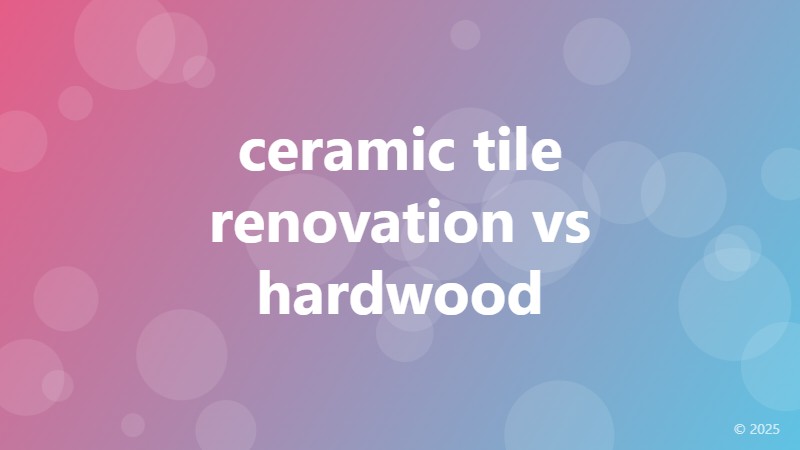ceramic tile renovation vs hardwood

Renovating Your Floors: Ceramic Tile vs Hardwood - Which is Best?
When it comes to renovating your floors, two popular options often come to mind: ceramic tile and hardwood. Both have their own unique advantages and disadvantages, making it essential to weigh the pros and cons of each before making a decision. In this article, we'll delve into the world of ceramic tile renovation vs hardwood, exploring the benefits, drawbacks, and ultimate suitability of each option for your home.
Durability and Maintenance
One of the primary concerns for homeowners is the durability and maintenance requirements of their flooring. Ceramic tiles are known for their exceptional durability, resisting scratches, cracks, and fading with ease. They're also extremely low-maintenance, requiring only occasional sweeping and mopping to keep them looking their best. Hardwood floors, on the other hand, are more prone to scratches and dents, although they can be refinished to restore their original glory. Regular cleaning and polishing are necessary to maintain their appearance.
Aesthetics and Versatility
Both ceramic tile and hardwood floors offer a wide range of aesthetic options. Ceramic tiles come in a vast array of colors, patterns, and textures, allowing homeowners to create a unique look that suits their style. Hardwood floors, too, offer a variety of species, stains, and finishes, but their natural beauty often speaks for itself. However, ceramic tiles can mimic the look of hardwood, making them a more affordable alternative for those who want the hardwood look without the hefty price tag.
Cost and Installation
The cost of ceramic tile renovation vs hardwood installation varies significantly. Ceramic tiles are generally more affordable, with prices ranging from $3 to $15 per square foot, depending on the quality and type of tile. Hardwood floors, on the other hand, can cost anywhere from $5 to $20 per square foot, with exotic species and custom installations pushing the price even higher. Installation costs also vary, with ceramic tile installation typically being more labor-intensive and expensive than hardwood installation.
Moisture Resistance and Allergy Concerns
For homeowners who live in humid or coastal areas, moisture resistance is a critical factor in their flooring choice. Ceramic tiles are impervious to water damage and humidity, making them an ideal choice for bathrooms, kitchens, and laundry rooms. Hardwood floors, while durable, are more susceptible to water damage and warping. Additionally, ceramic tiles are hypoallergenic, resisting dust mites, mold, and mildew, whereas hardwood floors can harbor allergens and dust particles.
In conclusion, the decision between ceramic tile renovation and hardwood installation ultimately comes down to your personal preferences, lifestyle, and budget. Both options offer unique advantages and disadvantages, making it essential to weigh the pros and cons carefully before making a decision. By considering factors such as durability, aesthetics, cost, and maintenance requirements, you'll be well on your way to choosing the perfect flooring solution for your home.